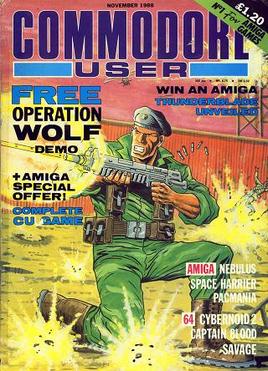
Commodore User, later renamed to CU Amiga, is a series of American and British magazines published by Commodore International.
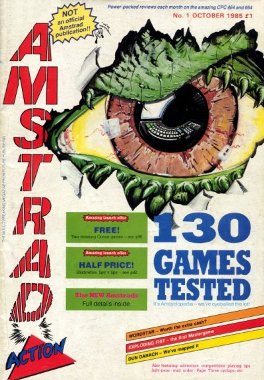
Amstrad Action was a monthly magazine, published in the United Kingdom, which catered to owners of home computers from the Amstrad CPC range and later the GX4000 console.
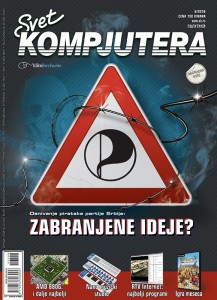
Svet kompjutera is a computer magazine published in Serbia. It has the highest circulation in the country. Svet kompjutera deals with subjects on home, PC computers, tablet computers, smartphones, and video game consoles as well as their use for work and entertainment. Its aim is to inform the readers about the latest events in Serbian and world computer scene and to present products that are interesting for its readers. Its editorial staff sees this as their main task to advise computer users on how to use their hardware and software in the best way.

Your Sinclair, or YS as it was commonly abbreviated, was a commercially published and printed British computer magazine for the Sinclair range of computers, mainly the ZX Spectrum. It was in circulation between 1984 and 1993.

Compute!, often stylized as COMPUTE!, was an American home computer magazine that was published from 1979 to 1994. Its origins can be traced to 1978 in Len Lindsay's PET Gazette, one of the first magazines for the Commodore PET computer. In its 1980s heyday, Compute! covered all major platforms, and several single-platform spinoffs of the magazine were launched. The most successful of these was Compute!'s Gazette, which catered to VIC-20 and Commodore 64 computer users.

Crash, stylized as CRASH, is a magazine dedicated to the ZX Spectrum home computer, primarily focused on games. It was published from 1984 to 1991 by Newsfield Publications Ltd until their liquidation, and then until 1992 by Europress. It was relaunched as a quarterly A5 magazine in December 2020 with the backing of the original founders.
Newsfield Publications Ltd was a British magazine publisher during the 1980s and early 1990s.

Zzap!64 is a computer games magazine covering games for computers manufactured by Commodore International, especially the Commodore 64 (C64). It was published in the UK by Newsfield Publications Ltd and later by Europress Impact.

The One was a video game magazine in the United Kingdom which covered 16-bit home gaming during the late 1980s and early 1990s. It was first published by EMAP in October 1988 and initially covered computer games aimed at the Atari ST, Amiga, and IBM PC compatible markets.

Micronet 800 was an information provider (IP) on Prestel, aimed at the 1980s personal computer market. It was an online magazine that gave subscribers computer related news, reviews, general subject articles and downloadable telesoftware.

Loadstar was a disk magazine for the Commodore 64 computer, published starting in 1984 and ceasing publication in 2007 with its unreleased 250th issue. It derived its name from the command commonly used to execute commercial software from a Commodore 1541 disk: LOAD "*",8,1, with inspiration from the word "lodestar".

Amstrad Computer User was the official magazine for the Amstrad CPC series of 8-bit home computers. This monthly publication, usually referred to as ACU by its readers, concentrated more on the hardware and technical side of the Amstrad range, although it had a small dedicated games section as well.

Fire Power is a military tank action game developed by Silent Software for the Amiga. It was released in 1987 and published by MicroIllusions and Activision. Ports were released for the Apple IIGS, the Commodore 64 and for MS-DOS in 1988. An Atari Lynx version was planned but development never started due to internal conflict with Epyx.

Commodore Force was a computer games magazine covering games for the Commodore 64. It was published in the UK by Europress Impact. Its predecessor was Zzap!64.

Mega was a British monthly magazine that covered the Mega Drive video game console. During its time as one of the main Mega Drive publications, Mega covered the "golden age" of the Sega Mega Drive from 1992 to 1995. The magazine went through many changes including a re-design in content and layout before being sold to a rival publisher.
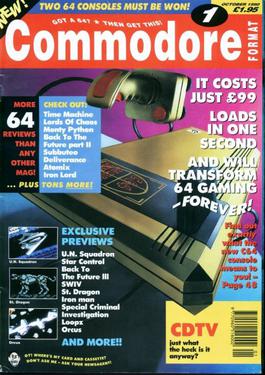
Commodore Format was a British magazine for users of the Commodore 64 home computer. It was published on the third Thursday of every month. All 61 issues were produced by Future plc. These came towards the end of the machine's commercial life - from October 1990 until October 1995.
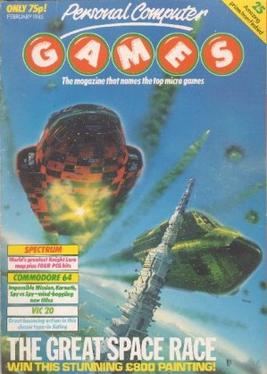
Personal Computer Games was a multi-format UK computer games magazine of the early/mid-1980s published by VNU.

New Computer Express was a weekly magazine published by Future Publishing in the UK from 1988 to 1991.

Top 40 Music Magazine was an English-language South African monthly music magazine published nationwide in print form between 1984 and 2002.

Fun School is a series of educational packages developed and published in the United Kingdom by Europress Software, initially as Database Educational Software. The original Fun School titles were sold mostly by mail order via off-the-page adverts in the magazines owned by Database Publications. A decision was made to create a new set of programs, call the range Fun School 2, and package them more professionally so they could be sold in computer stores around the UK. Every game comes as a set of three versions, each version set to cater for a specific age range.




















